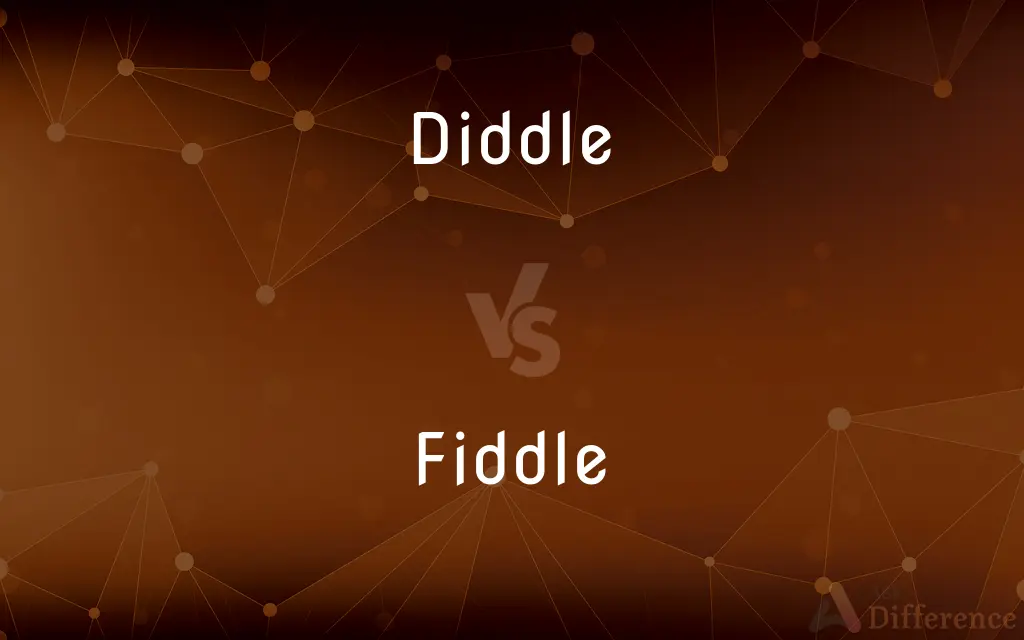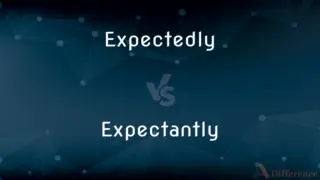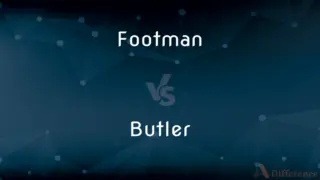Diddle vs. Fiddle — What's the Difference?
By Tayyaba Rehman & Maham Liaqat — Updated on April 23, 2024
Diddle involves deceit or manipulation, often linked to cheating or swindling; fiddle can mean to tinker or adjust something, but also refers to playing the violin.

Difference Between Diddle and Fiddle
Table of Contents
ADVERTISEMENT
Key Differences
Diddle is primarily used to describe acts of fraud or deception, where someone is tricked or swindled out of something. On the other hand, fiddle can be used in a more innocuous context, such as adjusting or tampering with objects, often in a way that suggests aimlessness or lack of a clear purpose.
In some contexts, diddle suggests a calculated, dishonest action intended to gain something unlawfully. Whereas, fiddle might simply refer to the act of playing with or manipulating something without any fraudulent intentions.
Diddle is often used in phrases like "diddle someone out of something," which highlights its association with deceit. Conversely, fiddle is commonly found in expressions like "fiddle around" or "fiddle with," implying a more harmless, albeit possibly annoying, behavior.
The seriousness associated with diddling is typically greater, reflecting its implications of trickery and significant deceit. On the other hand, fiddling can also refer to playing the violin, showcasing its dual meaning that ranges from trivial to artistic.
While diddle conveys negative connotations and is used in contexts requiring caution and wariness, fiddle, when used to refer to the musical instrument, carries a cultural and artistic significance, emphasizing skill and entertainment.
ADVERTISEMENT
Comparison Chart
Definition
To cheat or swindle
To tinker, adjust, or play violin
Connotations
Negative, deceitful
Neutral or positive, artistic
Usage in Phrases
"diddle out of"
"fiddle around," "fiddle with"
Common Contexts
Fraud, deception
Casual tinkering, music
Implications
Serious, involves deceit
Can be trivial or highly skilled
Compare with Definitions
Diddle
To cheat someone in a deceitful manner.
He diddled his investors out of millions.
Fiddle
To play the violin.
She loves to fiddle classical tunes.
Diddle
To waste time or dawdle unproductively.
He diddled away the hours watching TV.
Fiddle
To make minor adjustments or repairs.
He fiddled with the radio until he got a clear signal.
Diddle
To manipulate or swindle skillfully.
She was diddled by a cunning salesperson.
Fiddle
To engage in aimless or non-constructive activity.
Stop fiddling around and get to work.
Diddle
To engage in petty fraud.
They diddled all day by tweaking the accounts.
Fiddle
To commit minor acts of dishonesty.
He was caught fiddling the cash register.
Diddle
To trick or hoax playfully.
The kids diddled their friends on April Fool's Day.
Fiddle
To touch or handle something absentmindedly.
She fiddled with her pen during the meeting.
Diddle
(Slang) To cheat; swindle
"The Swiss have special laws for people who diddle hotels" (John le Carré).
Fiddle
A fiddle is a bowed string musical instrument, most often a violin. It is a colloquial term for the violin, used by players in all genres including classical music.
Diddle
To jerk up and down or back and forth.
Fiddle
A violin, especially one used to play folk or country music.
Diddle
To have intercourse with (a woman).
Fiddle
(Nautical) A guardrail used on a table during rough weather to prevent things from slipping off.
Diddle
To practice masturbation upon.
Fiddle
(Informal) Nonsensical, trifling matters
"There are things that are important / beyond all this fiddle" (Marianne Moore).
Diddle
To shake rapidly; jiggle.
Fiddle
Chiefly British An instance of cheating or swindling; a fraud.
Diddle
(Slang) To play experimentally; toy
The children diddled with the knobs on the television all afternoon.
Fiddle
To play a fiddle.
Diddle
(Slang) To waste time
Diddled around all morning.
Fiddle
To touch or handle something in a nervous way
Fiddled with the collar of his shirt as he spoke.
Diddle
(music) In percussion, two consecutive notes played by the same hand (either RR or LL), similar to the drag, except that by convention diddles are played the same speed as the context in which they are placed.
Fiddle
To make unskilled efforts at repairing or improving
Fiddled with the broken toaster.
Diddle
To cheat; to swindle.
Fiddle
To meddle or tamper
A reporter who fiddled with the facts.
Diddle
To molest.
Fiddle
Chiefly British To commit a fraud, especially to steal from one's employer.
Diddle
To masturbate (especially of women).
Fiddle
To play (a tune) on a fiddle.
Diddle
(transitive) To waste time.
Fiddle
Chiefly British To alter or falsify for dishonest gain
Fiddled the figures in the report.
Diddle
(intransitive) To totter, like a child learning to walk; to daddle.
Fiddle
Synonym of violin, a small unfretted stringed instrument with four strings tuned (lowest to highest) G-D-A-E, usually held against the chin and played with a bow; the position of a violinist in a band; any of various bowed stringed instruments, particularly those of the violin family when played non-classically.
When I play it like this, it's a fiddle; when I play it like that, it's a violin.
Diddle
To manipulate a value at the level of individual bits binary digits.
Fiddle
(figurative) clown: an unserious person entertaining a group.
Diddle
A meaningless word used when singing a tune or indicating a rhythm.
What's that tune that goes "diddle di-dum, diddle di-dum, diddle di-dum-dum"?
Fiddle
(figurative) Unskillful or unartful behavior, particularly when showy and superficially pleasing.
Diddle
To totter, as a child in walking.
Fiddle
Synonym of scam, a fraud or swindle.
Diddle
To cheat or overreach.
Fiddle
(slang) workaround, a quick and less than perfect solution for some flaw or problem.
That parameter setting is just a fiddle to make the lighting look right.
Diddle
Deprive of by deceit;
He swindled me out of my inheritance
She defrauded the customers who trusted her
The cashier gypped me when he gave me too little change
Fiddle
Any rail or device that prevents items from sliding off a table, stove, etc. in rough water.
Diddle
Manipulate manually or in one's mind or imagination;
She played nervously with her wedding ring
Don't fiddle with the screws
He played with the idea of running for the Senate
Fiddle
Synonym of arrest warrant.
Fiddle
Synonym of watchman's rattle.
Fiddle
A trifling amount.
Done at a fiddle.
Fiddle
Something resembling a violin in shape, particularly:
Fiddle
(biology) A dock (Rumex pulcher) with leaves supposed to resemble the musical instrument.
Fiddle
A long pole pulled by a draft animal to drag loose straw, hay, etc.
Fiddle
A rack for drying pottery after glazing.
Fiddle
To play the fiddle or violin, particularly in a folk or country style.
To fiddle while Rome burns
Fiddle
To fidget or play; to idly amuse oneself, to act aimlessly, idly, or frivolously, particularly out of nervousness or restlessness.
Stop fiddling with your food. Either tell me what's wrong or just eat.
Fiddle
(informal) To cheat or swindle; to commit fraud.
Fred was fiddling the books.
Fiddle
Senseid|en|sort out by tinkering}} (informal) {{synonym of tinker, to make small adjustments or improvements.
I needed to fiddle with these settings to get the image to look right.
Fiddle
(obsolete) fiddlesticks.
Oh, fiddle. I left my whip in the stable.
Fiddle
A stringed instrument of music played with a bow; a violin; a kit.
Fiddle
A kind of dock (Rumex pulcher) with fiddle-shaped leaves; - called also fiddle dock.
Fiddle
A rack or frame of bars connected by strings, to keep table furniture in place on the cabin table in bad weather.
Fiddle
To play on a fiddle.
Themistocles . . . said he could not fiddle, but he could make a small town a great city.
Fiddle
To keep the hands and fingers actively moving as a fiddler does; to move the hands and fingers restlessy or in busy idleness; to trifle.
Talking, and fiddling with their hats and feathers.
Fiddle
To play (a tune) on a fiddle.
Fiddle
Bowed stringed instrument that is the highest member of the violin family; this instrument has four strings and a hollow body and an unfretted fingerboard and is played with a bow
Fiddle
Avoid (one's assigned duties);
The derelict soldier shirked his duties
Fiddle
Commit fraud and steal from one's employer;
We found out that she had been fiddling for years
Fiddle
Play the violin or fiddle
Fiddle
Play on a violin;
Zuckerman fiddled that song very nicely
Fiddle
Manipulate manually or in one's mind or imagination;
She played nervously with her wedding ring
Don't fiddle with the screws
He played with the idea of running for the Senate
Fiddle
Play around with or alter or falsify, usually secretively or dishonestly;
Someone tampered with the documents on my desk
The reporter fiddle with the facts
Fiddle
Try to fix or mend;
Can you tinker with the T.V. set--it's not working right
She always fiddles with her van on the weekend
Common Curiosities
What type of actions does "diddle" typically describe?
"Diddle" typically describes actions intended to deceive or manipulate others for personal gain.
Does "fiddle" have any musical connotations beyond playing the violin?
Yes, "fiddle" refers specifically to playing the violin but can be used metaphorically to describe someone skillfully managing or manipulating other situations.
What does it mean to "fiddle around"?
"Fiddle around" means to engage in aimless activity, often tinkering or meddling with something without serious intent.
Are there specific contexts where "diddle" is more commonly used?
"Diddle" is commonly used in contexts involving financial or personal deceit, such as scams or fraudulent activities.
How do the verbs "diddle" and "fiddle" impact the tone of a sentence?
"Diddle" often adds a tone of suspicion or wrongdoing, whereas "fiddle" can lighten the tone or imply casual, harmless activity.
How does one typically "fiddle with" something?
"Fiddle with" generally refers to aimlessly adjusting, manipulating, or playing with something, often without any particular goal.
What should one be cautious of when someone is said to "diddle"?
When someone is described as diddling, it’s wise to be cautious of potential deceit or fraudulent intent involved.
Can "diddle" be used in a business context?
In business contexts, using "diddle" suggests unethical practices, and it is generally advised to use the term cautiously due to its negative implications.
Can "fiddle" be used to describe detailed work?
Yes, "fiddle" can imply making detailed or fine adjustments to something, particularly in a technical or mechanical context.
What legal implications can "diddle" have?
"Diddle" can involve activities with legal ramifications, especially if it pertains to fraud or other forms of financial deceit.
How does "diddle" differ from general dishonesty?
"Diddle" implies a more cunning or clever form of dishonesty, typically involving elaborate schemes or manipulations.
Can "fiddle" be used in a professional setting?
In professional settings, "fiddle" is usually informal, often referring to minor adjustments or tweaking processes.
Is "diddle" ever acceptable in casual conversation?
While "diddle" can be used casually, its connotations of deceit may give it a more serious tone, even in informal settings.
Is "fiddle" viewed positively or negatively in cultural contexts?
In cultural contexts, especially relating to music, "fiddle" is viewed positively as it relates to skill and artistry.
What is the difference between "fiddle" as a noun and a verb?
As a noun, "fiddle" refers to the violin, a stringed musical instrument. As a verb, it means to adjust, tinker, or play the violin.
Share Your Discovery

Previous Comparison
Expectedly vs. Expectantly
Next Comparison
Footman vs. ButlerAuthor Spotlight
Written by
Tayyaba RehmanTayyaba Rehman is a distinguished writer, currently serving as a primary contributor to askdifference.com. As a researcher in semantics and etymology, Tayyaba's passion for the complexity of languages and their distinctions has found a perfect home on the platform. Tayyaba delves into the intricacies of language, distinguishing between commonly confused words and phrases, thereby providing clarity for readers worldwide.
Co-written by
Maham Liaqat












































